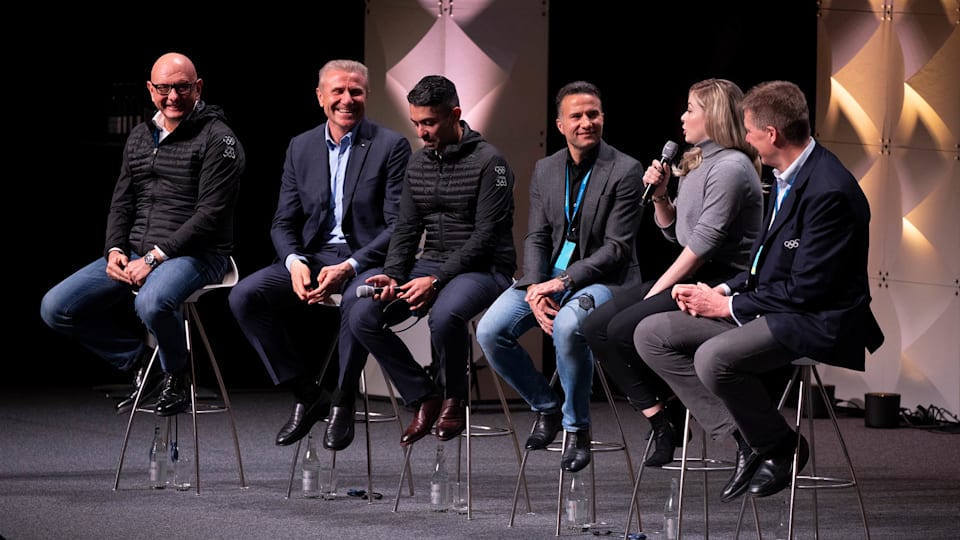Tackling mental health in Olympic sport
Each year, the IOC Medical and Scientific Commission adopts a consensus statement on a prominent issue that affects the well-being of athletes. In 2018, the Commission held a consensus meeting to address mental illness in elite sport, a topic discussed today at the International Athletes’ Forum in Lausanne.

From Michael Phelps’s candid disclosures about his struggles with depression following the Olympic Games London 2012, to Lindsey Vonn’s openness in describing her decade-long battle with the illness, an increasing number of athletes are speaking out about their often hidden struggles with mental health problems.
Scientific research currently suggests that mental health disorders affect up to 35 per cent of elite athletes at some stage of their careers. This can range from burnout and substance abuse to eating disorders, depression and anxiety. The triggers can be highly varied, with studies pointing to a range of contributing factors from poor sleep to selection pressures and premature retirement due to injury. In the case of Phelps and many others, it was the post-Olympic slump that prompted a downward spiral leading to suicidal thoughts.
“While there isn’t any evidence to suggest that mental illness is more prevalent in elite athletes than the general population, it’s important to approach these problems in athletes, bearing in mind the special situation they’re in, and the big life stresses they face,” says International Olympic Committee Medical and Scientific Director Dr Richard Budgett.
As a result, over the past two years, the IOC has sought to initiate a number of projects that increase our understanding of athlete mental health, and to develop ways to help athletes and their entourages detect and handle mental health concerns.
To begin with, a group of 20 experts from around the world – consisting of leading psychiatrists, psychologists, athlete representatives and sports medicine professionals – have scoured almost 15,000 research articles to produce an evidence-based consensus document on mental health disorders in elite athletes. This will be published in May 2019.
But while this overview of the current scientific knowledge is vitally important, it is only one part of the puzzle. Few coaches and officials in sport have an expert understanding of mental health, and the IOC also recognises that there is a great need for practical assessment tools that can be used by medical professionals and anyone looking after athletes. A small working group is scheduled to meet on 15 April to look at new measures that can be put in place by Federations and National Olympic Committees (NOCs) in the future to protect athlete mental health.
“We have a similar project for concussion, which is reviewed every four years,” Dr Budgett says. “It’s done in conjunction with a number of International Federations for which concussion is a concern, and it’s resulted in a sport concussion assessment tool called SCAT. It’s in the form of a questionnaire, which makes it as easy as possible for concussion to be identified, and then within that are guidelines on how long an athlete should rest, and how they should be rehabilitated as quickly and as safely as possible. So we have a similar vision for mental illness in athletes, a tool which can be part of the normal care and assessment process, and the Athletes’ Commission is very supportive of that.”
But to properly get to grips with mental health in elite sport, there is also a need to continue raising awareness and reduce the stigma that still surrounds the subject. Dr Budgett says that the efforts of globally recognised and successful athletes, such as Phelps, in speaking out about their own personal struggles have already had a major positive impact.
“I think that athletes speaking candidly about issues which have been difficult for others to talk about can be very helpful, especially if they’re famous, elite athletes. It’s been really helpful in this case in raising the awareness, so that people realise just how important it is.”
However, there is still more that can be done. Mental health has been a key point of discussion today at the 2019 International Athletes’ Forum, and last December the IOC held a workshop on the subject with representatives from all the International Federations and a number of NOCs. This was aimed at ensuring that all Olympic sports and medical commissions, as well as the various athletes’ commissions, are aware of the IOC’s ongoing projects and to hear viewpoints on what is needed going forwards.
“The key points we’ve heard are that mental health issues should be addressed more openly in sport, because understandably athletes are always concerned about selection, and they want to appear as robust as possible,” Dr Budgett says. “But in the end this can be counter-productive, so mental health issues need to be recognised and addressed constructively by coaches, and the rest of the entourage.
“So that’s our drive really: recognition and reduction of the stigma so that athletes can get proper management and help when they need it. The Athletes’ Forum is really useful for raising awareness of this, as well as getting the athletes’ views on what other ideas there are for improving management and recognition of mental health issues. It’s a two-way process. We listen to the athletes, and hopefully they can learn from us as well.”